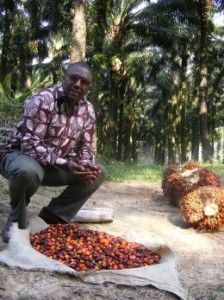Africa-Asia Confidential
December 2009
In January, Liberian officials are set to finalise negotiations for a US$1.6 billion palm oil investment deal with Indonesia’s Golden VerOleum. The past year has seen a number of feasibility studies into weather and land conditions, and production is scheduled to begin nine months into 2010, should negotiations proceed at pace.
Richard Tolbert, Chairman of the National Investment Commission, told Africa-Asia Confidential that a crucial moment for this deal will be the major diligence meeting in January. An insider close to the deal said that a quick start-up was unlikely because the government and the Indonesians were headed for a ‘tough’ series of negotiations over the fiscal terms. The initial breakdown of the $1.6 bn. includes $850 million to develop the land and associated infrastructure, $400 mn. to build at least 20 palm oil refineries, $250 mn. for housing and $100 mn. for machinery.
Negotiations have been led by the Interministerial Concessions Committee, formed by President Ellen Johnson-Sirleaf. This is made up of various ministers, including the Ministers of Agriculture, Finance, Planning and Labour. It also includes the Minister of State in the Office of the President, as well as the Chairman of the NIC. Golden VerOleum has been represented in negotiations by its Chairman, Franky Widjaja, the son of Indonesia’s fifth richest man, Eka Tjipta Widjaja.
Golden VerOleum plans to acquire 200,00 hectares in south-eastern Liberia. The target areas are Grand Kru, Maryland, River Cess, River Gee and Sinoe counties. The export plans are based on a plantation system in which there are about 10 hectares for each worker. The NIC’s Tolbert said that although ‘there is somewhat of a land grab going on...we are going to be careful not to give too much land away.’
The land required will be sourced through forestry concessions and ecological preserves. Environmental groups plan to protest the deal, in light of what intensive palm cultivation has done to the ecosystems of Indonesia and Malaysia.
How easy negotiations will be is dependent on how receptive Golden VerOleum is to the model agreement that has been passed to it by the Liberian team. The investment opportunity was presented to the Liberians by Golden Agri-Resources (GAR), a listed company in Indonesia, and the groundwork was then undertaken by Golden VerOleum, a consortium partner. GAR is a subsidiary of Sinar Mas, one of Indonesia’s largest conglomerates. Global consumer goods giant Unilever suspended its contract with Sinar Mas subsidiary PT SMART in Indonesia this December because Greenpeace found the company to be clearing protected forests that house endangered species.
The palm oil venture offers Monrovia another chance for economic and diplomatic diversification. In May, Malaysia’s Sime Darby inked a $800 mn., 63-year lease for 200,000 hectares of rubber and oil palm plantations in western Liberia.
Golden VerOleum’s Widjaja foresees high oil prices of about $1,000 per tonne for years to come on growth in consumption in India and China of about 20% per year.
Oil palm offers long-term economic benefits that mining is unable to match. The project will also necessitate improvements to infrastructure, particularly roads and harbours, and could create between 30,000-40,000 direct jobs within the next ten years, making Golden VerOleum one of the largest-scale employers in Liberia.











